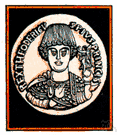Os·tro·goth
(ŏs′trə-gŏth′)n.
One of a tribe of eastern Goths that conquered and ruled Italy from ad 493 to 555.
[From Middle English Ostrogotes, Ostrogoths, from Late Latin Ostrogothī : ostro-, eastern (of Germanic origin; see aus- in Indo-European roots) + Gothī, Goths; see Goth.]
Os′tro·goth′ic adj.
American Heritage® Dictionary of the English Language, Fifth Edition. Copyright © 2016 by Houghton Mifflin Harcourt Publishing Company. Published by Houghton Mifflin Harcourt Publishing Company. All rights reserved.
Ostrogoth
(ˈɒstrəˌɡɒθ)n
(Peoples) a member of the eastern group of the Goths, who formed a kingdom in Italy from 493 to 552
[C17: from Late Latin Ostrogothī, from ostro- east, eastward + Goth]
ˌOstroˈgothic adj
Collins English Dictionary – Complete and Unabridged, 12th Edition 2014 © HarperCollins Publishers 1991, 1994, 1998, 2000, 2003, 2006, 2007, 2009, 2011, 2014
Os•tro•goth
(ˈɒs trəˌgɒθ)n.
a member of the eastern division of the Goths, who entered Italy in a.d. 488, maintaining a kingdom there until 555.
[1640–50; < Late Latin]
Os`tro•goth′ic, adj.
Random House Kernerman Webster's College Dictionary, © 2010 K Dictionaries Ltd. Copyright 2005, 1997, 1991 by Random House, Inc. All rights reserved.
ThesaurusAntonymsRelated WordsSynonymsLegend:
| Noun | 1. |  Ostrogoth - a member of the eastern group of Goths who created a kingdom in northern Italy around 500 AD Ostrogoth - a member of the eastern group of Goths who created a kingdom in northern Italy around 500 ADGoth - one of the Teutonic people who invaded the Roman Empire in the 3rd to 5th centuries |
Based on WordNet 3.0, Farlex clipart collection. © 2003-2012 Princeton University, Farlex Inc.